In today’s competitive business landscape, SaaS tools offer streamlined solutions for entrepreneurs. However, small businesses often struggle to balance cost and functionality. Good news: there are budget-friendly marketing, sales, CRM, and analytics tools that can meet the needs of startups and small businesses without breaking the bank.
Discover 15 SaaS tools that will enhance your operations while keeping finances in check.
Navigate:
What are SaaS tools?
SaaS stands for ‘Software as a Service’. It is a model of providing various services, apps, and tools in the Cloud, without the need to download software to your computer. For example, whenever you register to a service and start using it right away in the web browser, you’re using SaaS technology.
The most populous market for SaaS tools is engineering, marketing, and business operations, but the SaaS development model is seeing rocketing growth across all industries. According to Blissfully’s 2019 SaaS Trends Report, in 2018 U.S. small businesses (0-50 employees) spent over $20k on paid SaaS subscriptions. That’s double the spending amount from 2016.
Freemium and cost-effective SaaS tools for small business
The above expenses may seem overwhelming if you’re just starting out, own a home business, or are a solopreneur. If you don’t want to be swallowed up by competitors, though, you’ll need to learn not to cut down, but save up: in other words, find the right technology that will both do the job and save you money. Finding the right balance is key – and completely possible with these fresh and classic, freemium and low-cost tools for small business and startups.
1. MightyCall: on-the-go communication across all devices and platforms
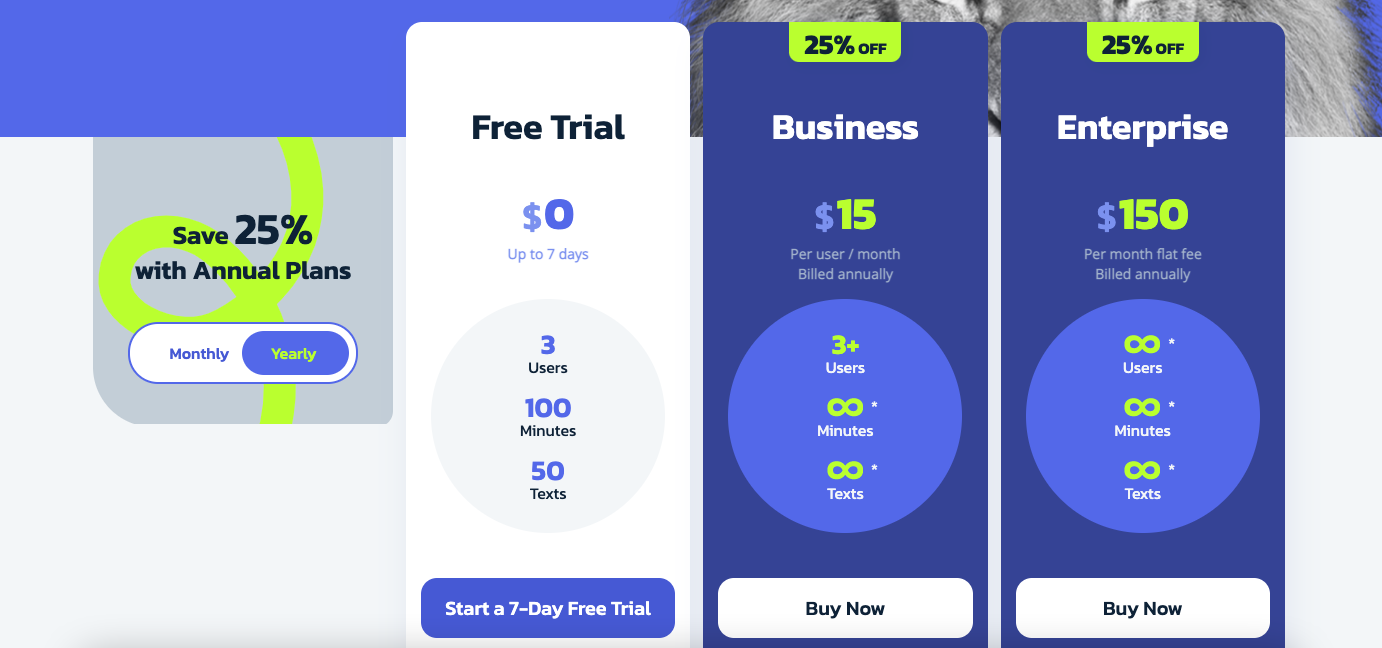
Screenshot via MightyCall
As of 2018, three out of four U.S. adults live in wireless-only households. Come to think of it, that’s no surprise in an age when life itself is mobile-first. Mobile devices have also transformed business communication: Voice over IP (VoIP) technologies are fast replacing landlines in offices, hospitals, call centers, etc.
MightyCall is a small business-first VoIP phone system that offers local, toll-free, and vanity numbers, the ability to port in your existing virtual number for a better deal, plus over 35 features like these:
- Business caller ID for a professional image wherever you go
- Unlimited extensions to keep customers connected with your team
- Call flows and call menus for organizing incoming calls by user, working hours, availability status, etc.
- Custom voicemail greetings and voice prompts
- Activity queues that display all activities that need action (e.g. missed calls, SMS, voicemail, messages from integrated social media and web widgets)
- Call history and analytics to help your business gain leads
- Call recording to gather important customer feedback
- Call back and click-to-call widgets that engage callers via your website
- Integration with softphones and IP desk phones so you can keep talking the way you’re used to
- The Mighty Call mobile app so you can have the most useful MightyCall features on the go
- And more
Although MightyCall doesn’t offer a free lifetime plan, using a VoIP phone system is proven to save up to 60% on phone bill costs – so it’s still a terrific deal for your team. Moreover, you get to test-drive the full-feature product with a free trial and get special deals on both MightyCall plans.
2. Wave—accounting for all occasions
Even amongst tight SaaS competition, Wave Financial is a classic that makes nearly every free SaaS tools list – and for good reason. The product really stands out thanks to its unlimited service model.
While freemium accounting tools like Zoho Invoicing and Freshbooks may have advanced business features (on their paid plans) that Wave lacks, the latter is still a beloved choice for small businesses.
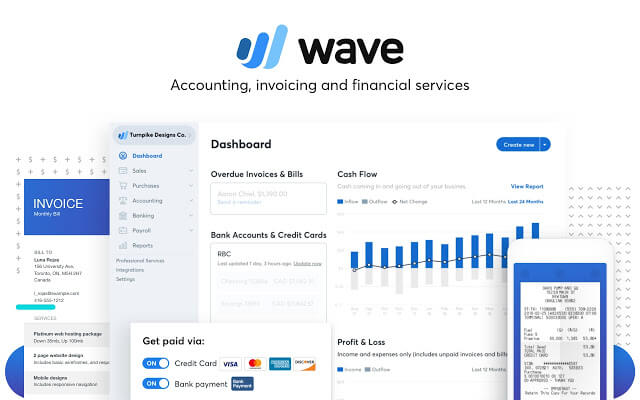
That said, Wave’s Cloud financial service isn’t exactly freemium: it’s completely free. The financial tool offers free accounting, invoicing, payroll, receipts, tax calculations, deductions, and more. In short, it’s the no strings attached SaaS accounting tool every small business should start out with.
3. Sumo—superb customer engagement
Cart abandonment during online shopping is one of the greatest challenges online store owners experience. With a rocketing 76% of online carts being abandoned, this invisible culprit is responsible for $4.6 trillion in lost e-commerce sales annually.
Sumo is a freemium ecommerce tool created to fight such issues: business owners can set up the Sumo tools on their website to start reducing cart abandonment rates in real time. Sumo shows you ROI from every single sale or subscriber, to make sure you see what they’re doing for you.
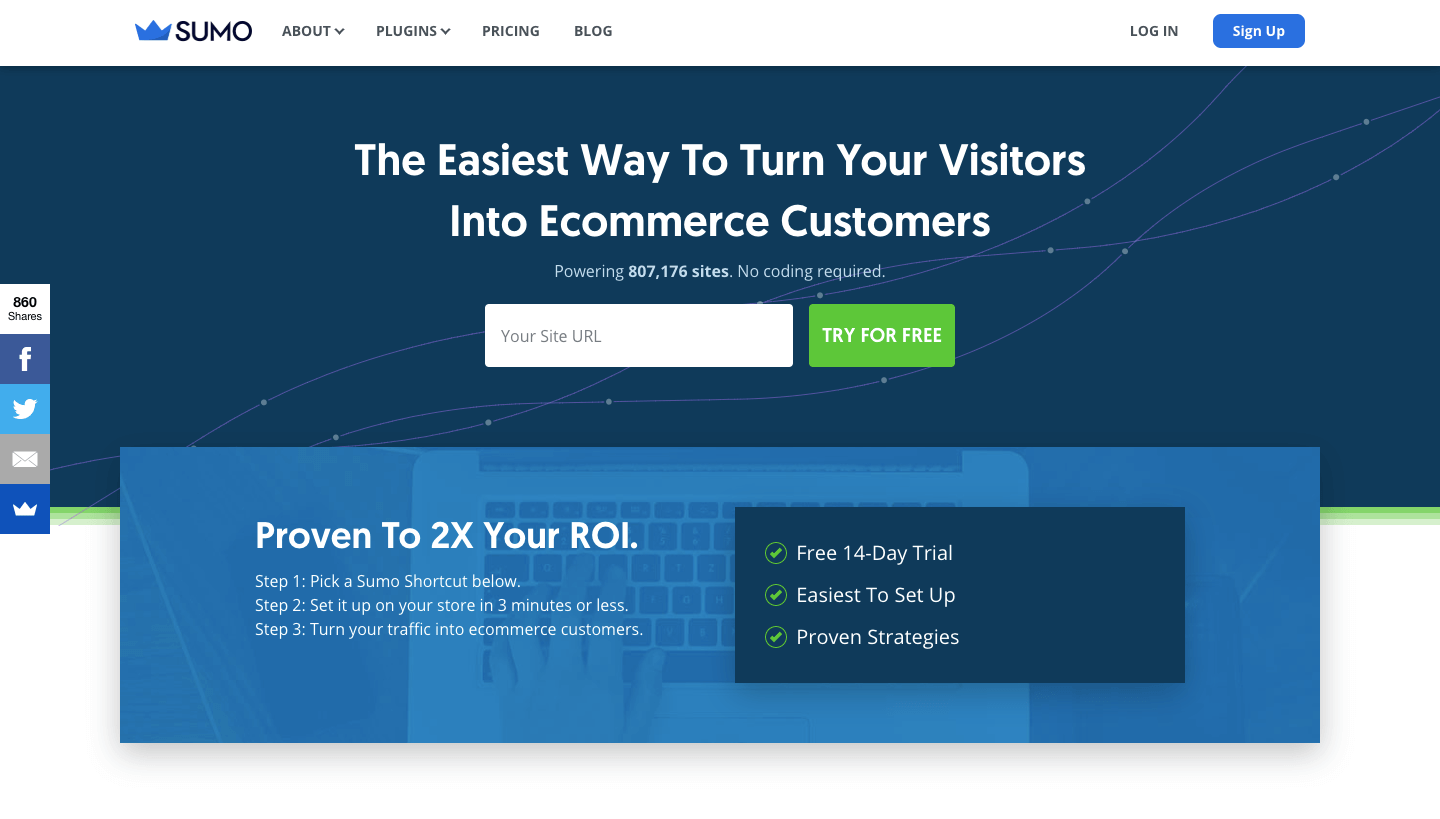
Sumo’s WordPress plugin is very popular, but it integrates just as well with other web and ecommerce services. The free plan promises to drive up to $500 in extra monthly revenue for your online store.
If you like the free version, you can switch anytime to the $39/month PRO plan to go for unlimited benefits.
4. SendinBlue e-mail automation
Newsletters are a huge thing. According to WBR Digital, 80% of retail professionals say it’s their number one customer retention tool. Further, email marketing statistics show that for each $1 spent on email campaigns, business owners get a ROI of $44.
For the same reasons however, email campaigns can swallow up a ton of time – from crafting the right content to making the design modern and attractive enough to encourage click- through rates, email marketing seems like an art in itself.

SendinBlue relates to those struggles and offers business owners simple SaaS marketing. With designer newsletter templates for all business occasions, automation workflow (campaigns based on clicks, purchase data, open rates, website visits, etc.), a landing page editor, SMS marketing (a tool that’s not readily available with competitors), and detailed reports, SendinBlue is the fresh alternative to MailChimp (which is still a classic thanks to its countless integrations).
5. SurveySparrow—the new word in customer feedback
SurveyMonkey, move over! Founded just over two years ago, SurveySparrow makes sending surveys to customers and employees nothing short of a joy.
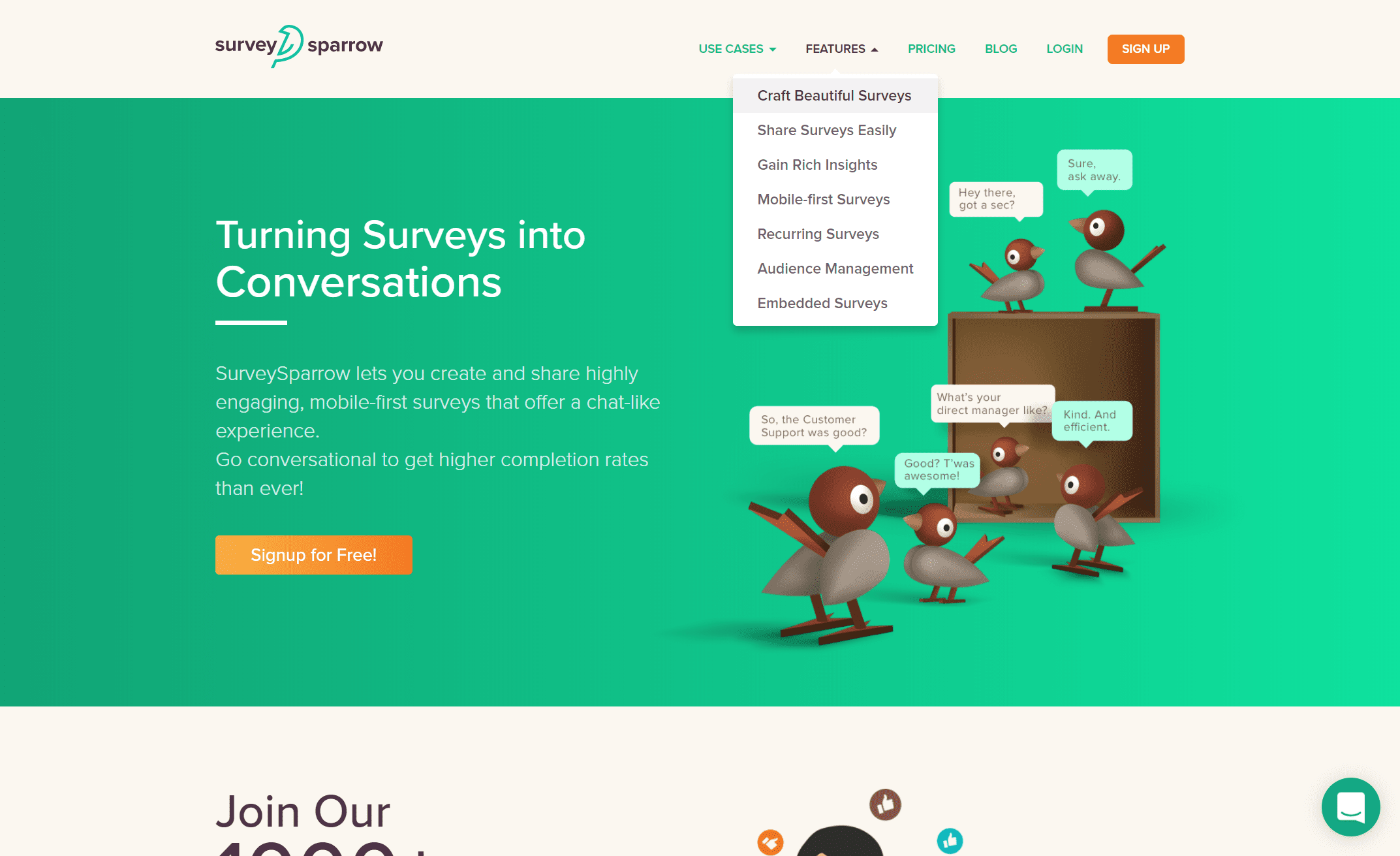
The SurveySparrow startup story reflects a personal mission to revolutionize boring old surveys with an interactive/chat-like experience plus develop mobile-first surveys, prioritize mailing scheduling options and add simple social sharing. SurveySparrow’s great UI allows users with no tech knowledge to craft awesomely-designed surveys that customers actually love to engage with, helping you nail that sought-after feedback and gain real interaction with your audience.
You can try the free Basic plan (includes 100 responses per month, 10 questions per survey, advanced reports filters, and more) to get the hang of the process and upgrade when necessary.
6. Cyfe—business data organization
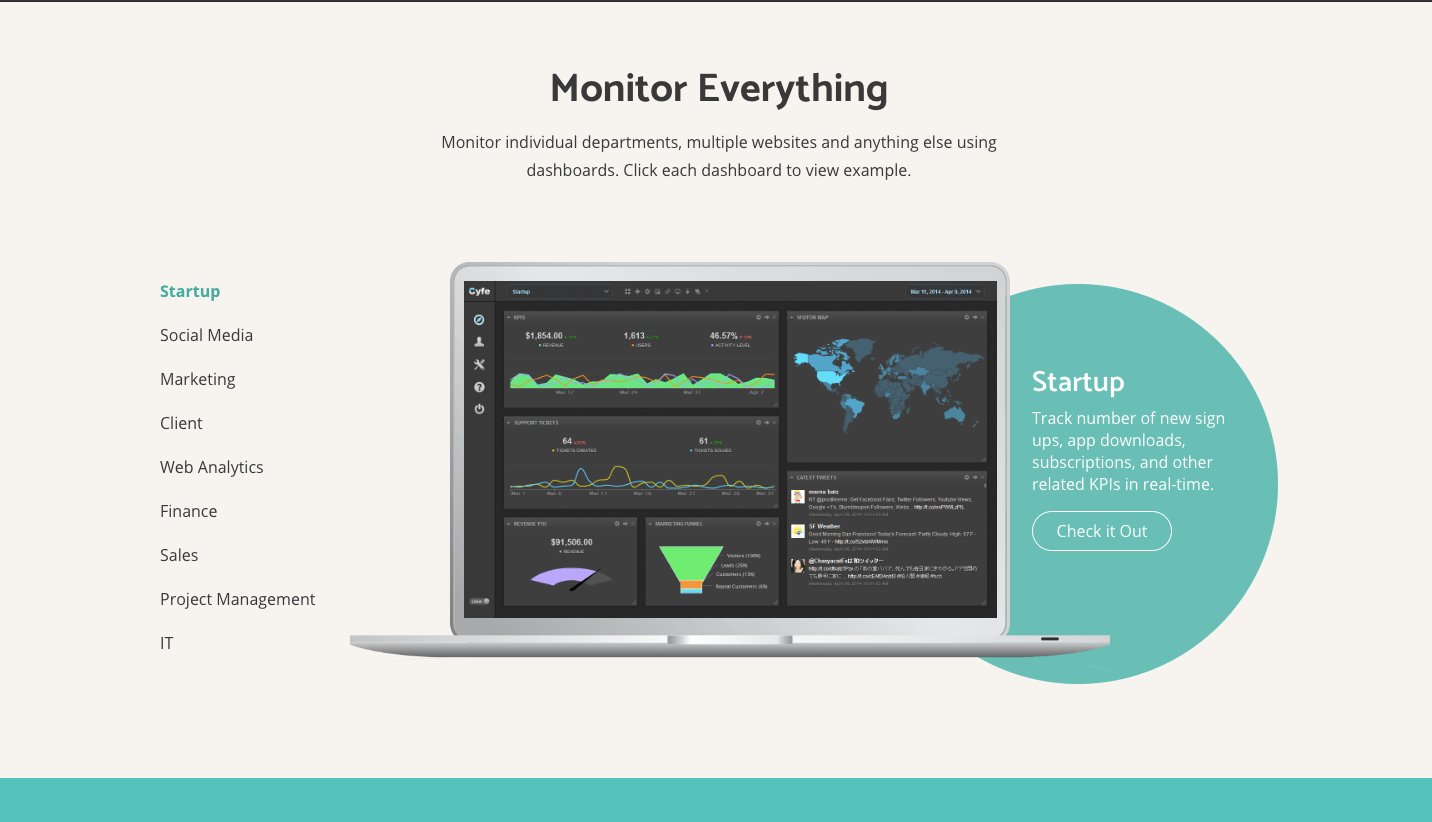
Wouldn’t it be terrific to monitor all your business data from various tools and apps on one or two dashboards? We’re talking all kinds of marketing, sales, SEO, CRM, and organizational channels you might be already using made visible in one Cloud service, with the ability to share the dashboards anytime with your team!
The Cyfe free plan gifts you with two fully functional dashboards that you can use to organize all your business data. The service integrates lots of services and is a great deal even with the free plan. If you need more dashboards (for example, your business grows, and you feel the need to organize data by departments) you can update your plan accordingly.
7. User.com—single-platform marketing automation
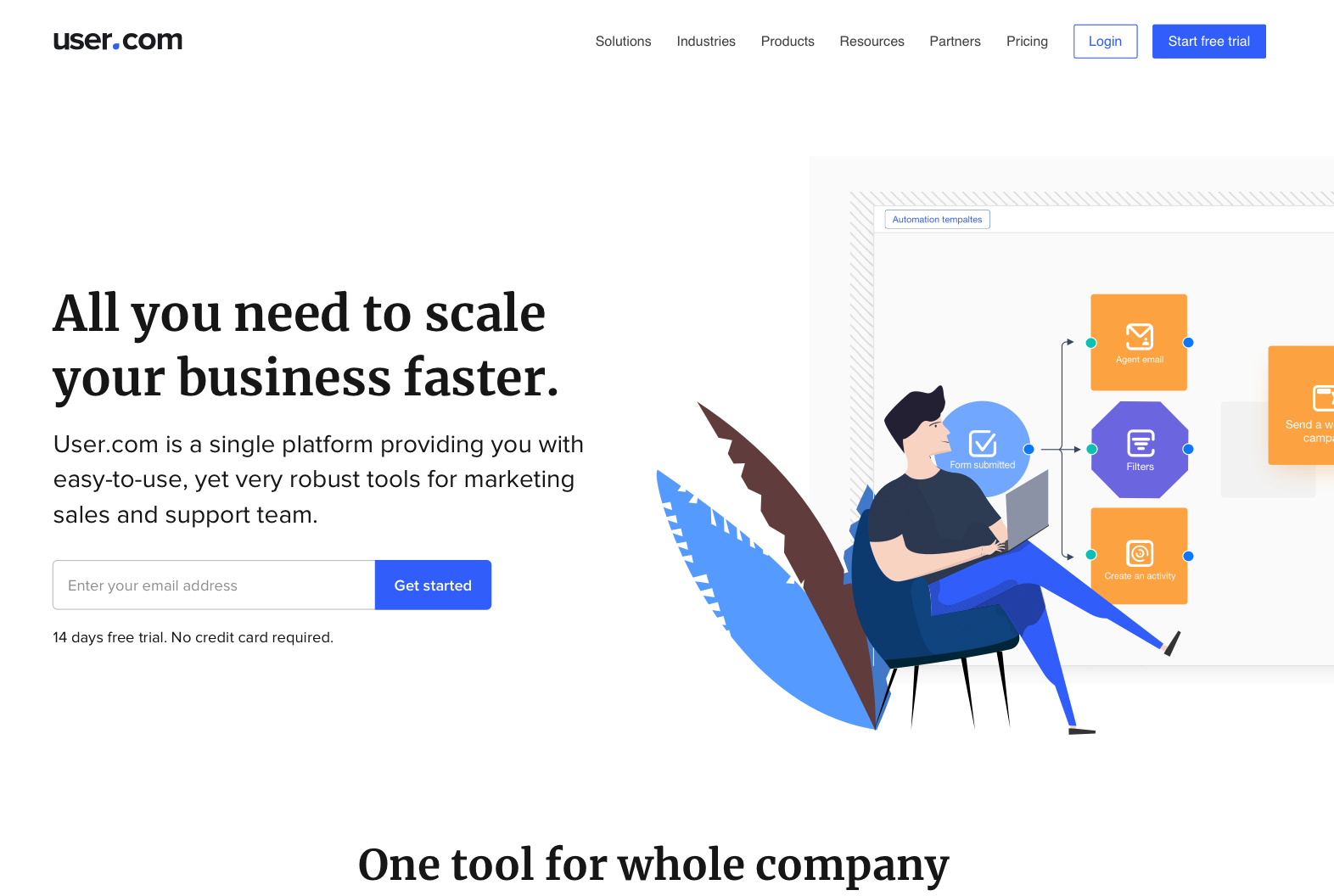
User.com is a full-stack marketing automation software for turning your visitors into happy customers.
User.com allows you to gather information about your prospects, communicate with them via live chat, chatbots, gather contact information by using popups, send automated emails and SMS and much more.
The tool makes it easy to create automated paths where you can pinpoint the moments your leads receive messages. It will save you time and make sure your communication is consistent.
Right now available in Freemium Starter Pack – 100% free, includes modules like: Chat, CRM, Knowledge Base, and Calendar.
8. Time Doctor—Manage Your Time and Double Your Productivity With Ease

Do you often wish you had more time to accomplish all the tasks in your itinerary? And wouldn’t it be nice to track how your outsourced workers, remote team members, and freelancers spend their time at work? Of course, you want to maximize your time at work and elsewhere. After all, time is money.
Time Doctor can help you maximize your time and boost the productivity of your remote teams. It allows you to draw up a to-do list for each day so that you can allocate the right amount of time for important tasks. What’s more, its anti-distraction feature nudges team members each time they want to get distracted by unproductive sites and apps.
Its accurate dashboards generate detailed reports and emails them to you periodically. This productivity app combines time-tracking features with employee monitoring, payroll module, screenshot monitoring, and chat monitoring features. If, for instance, you oversee a remote team of call center agents, Time Doctor can help you track how much time was spent on each task, each client and each project. Many business owners allocate employee management tasks to Time Doctor. What a fantastic way to boost productivity.
9. SEO Review Tools—optimized search engine ranking
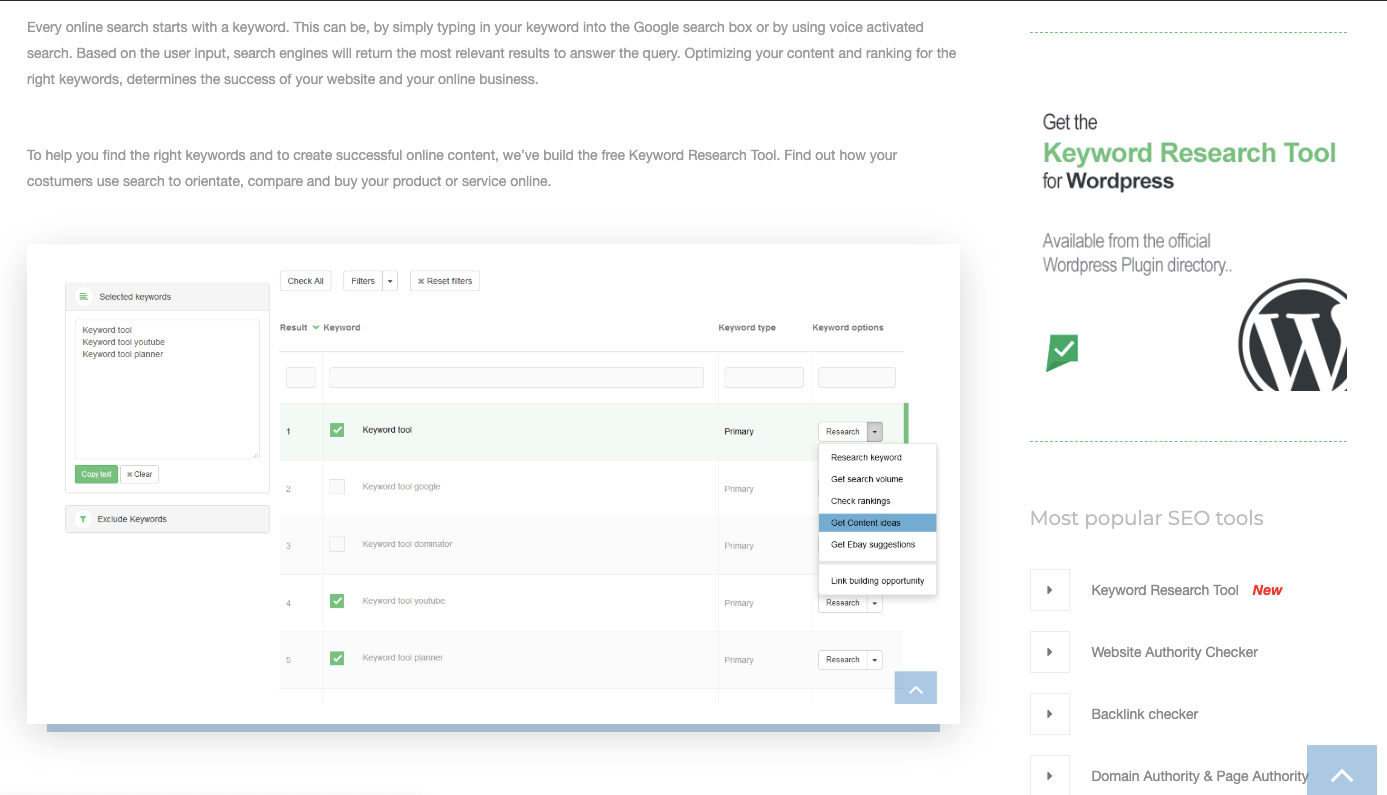
Another important thing to consider is search engine optimization or SEO. If you plan to drive traffic via a blog or written content, you’ll appreciate the free Keyword Research Tool, Content Idea Generator, and SEO Writing Assistant from SEO Review Tools.
A step beyond that, SEO Review Tools Service also helps you analyze backlinks, domain authority, and the Google Rankings of your website. And those are just some of the things you can do to improve ranking through this freemium SEO tool. The whole list numbers 37 real-time SEO tools for your business, both free and paid.
10. Canva—everyone’s favorite design tool
Every business owner who’s got a website, online store, or business social media accounts has once racked their brains over design. Just how do you match all those stunning banners, promo posts, branding materials, etc. that competitors seem to be flashing at you, without crazy investment in time or money?
That’s how it was before Canva jumped onboard the freemium tools arena. Nowadays, Canva is the most user-friendly design tool imaginable. With its help, anyone can design their own social media posts, web banners, and you name it promotional materials without leaving the web browser.
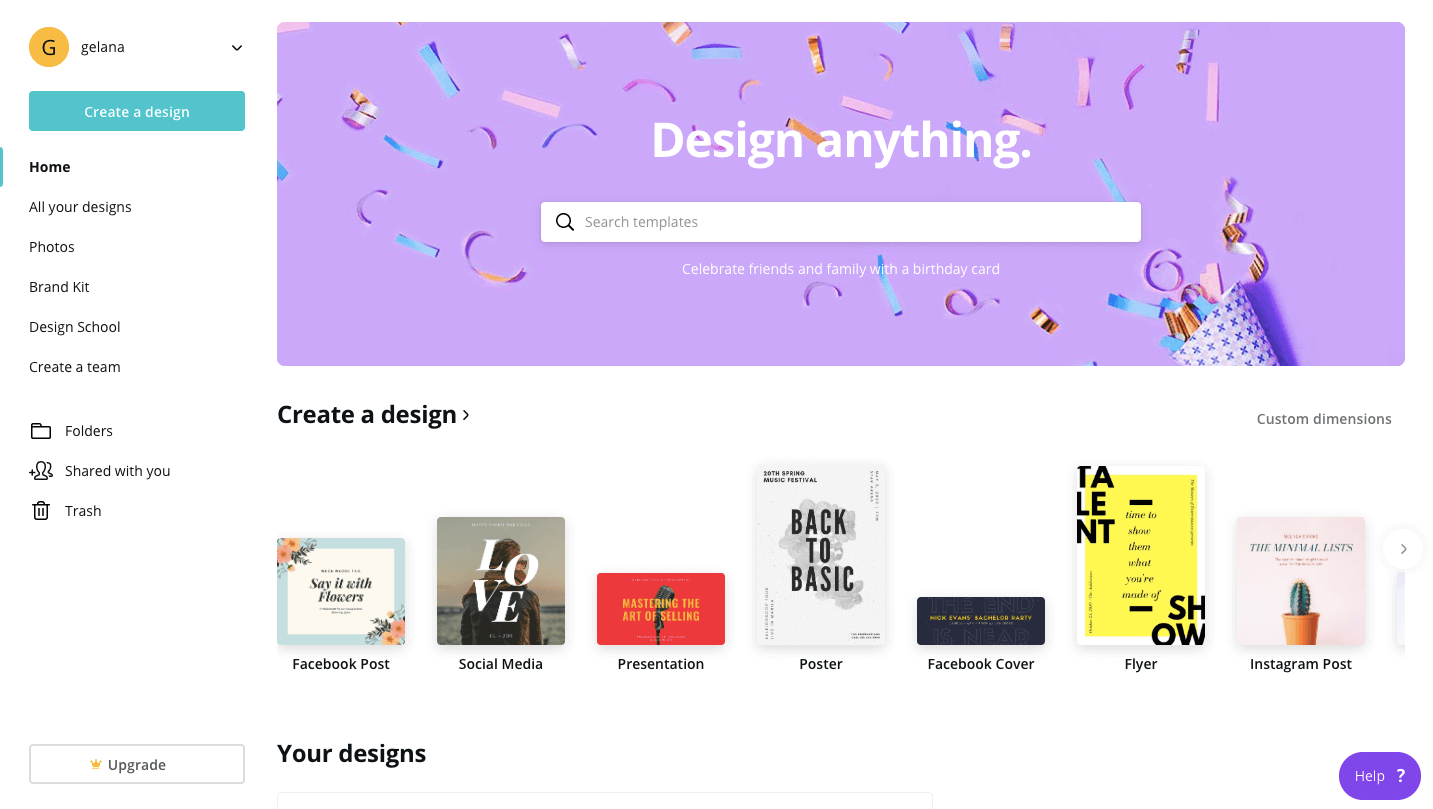
Canva is one of the great freemium Cloud tools out there – a small catch to the free version is the smaller (but still impressive) library of stock images at your disposal.
11. Buffer—social media made simple
If you have a business social media account, you’ve no doubt noticed that engagement times vary by hour and day. Such observations are baked by stats: for example, the best time for B2B tweets is around 3 p.m. on weekdays while B2C posts do well during commute hours (especially Monday mornings).
Now that’s great, but you have your own workday to worry about, right? In this case, using SaaS tools to schedule social media posts for the entire day (or week) ahead sounds like a life-saver.
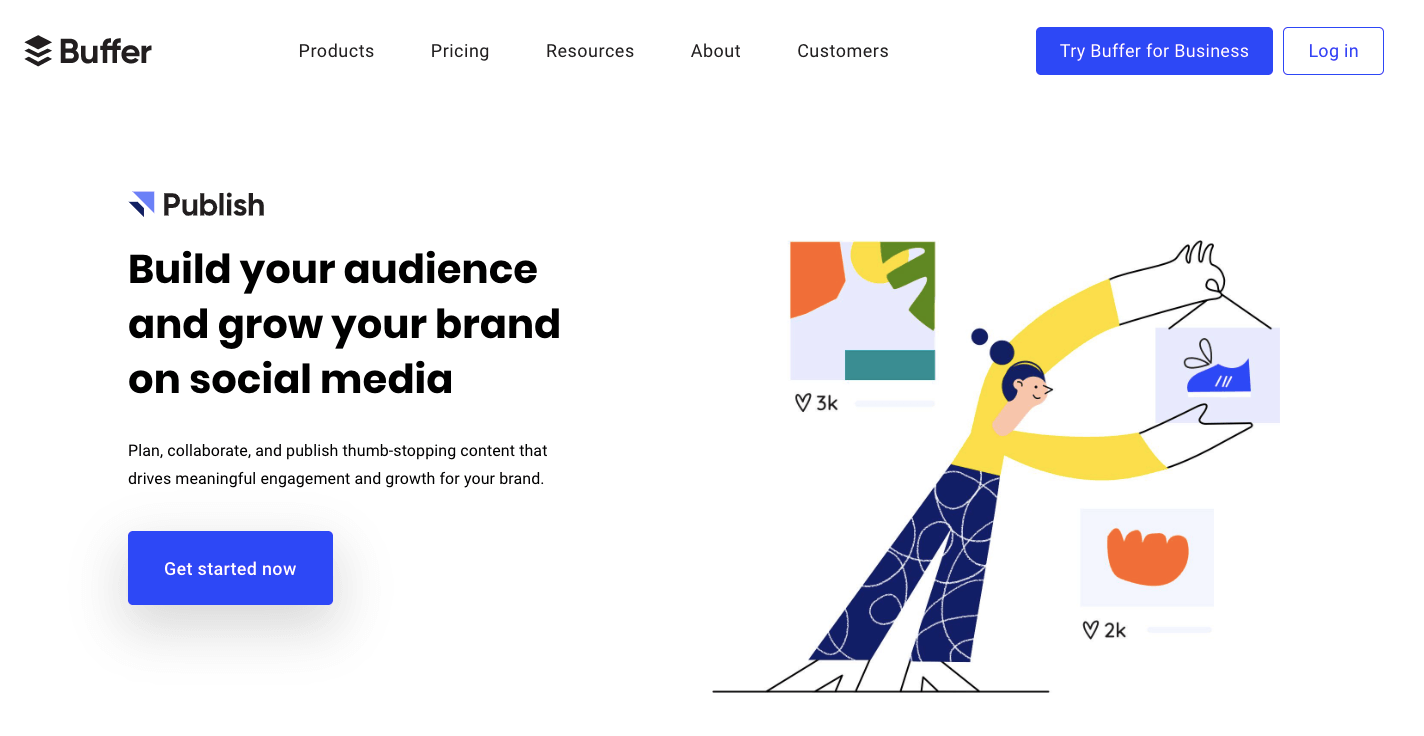
Buffer is a freemium social media tool that lets you publish to different social platforms without the hassle of doing it manually at different times throughout the day. You can let this free social media scheduling app automatically select the peak engagement times of day for you or choose your own.
12. HubSpot Suite CRM
Customer Relationship Management or CRM is an abbreviation seen all over the internet these days. On a basic level, Cloud CRM solutions let you organize your business contacts into one place and from there manage all interaction and communication, providing you with analytics on that communication process. On a deeper level, CRM stands for a very wide infrastructure of tools that encompass sales, analytics, customer service and marketing.
HubSpot CRM like other free CRM tools, provides a basic set of features in its free version. All of these features are centered around organizing, sorting through, and quickly communicating with your business contacts imported from various sources. This also includes analytics.
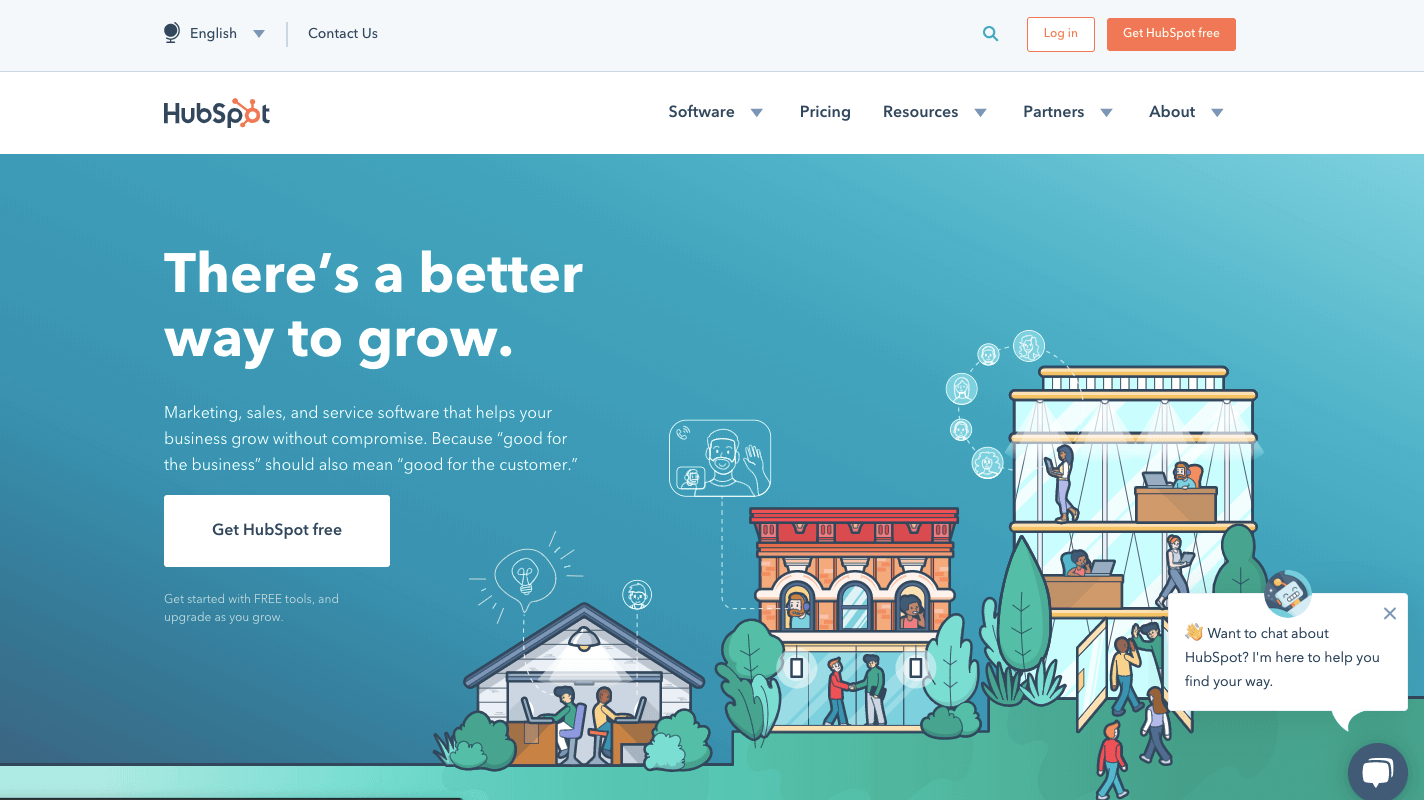
To get core benefits though, you will eventually want to look into the paid HubSpot tools – such as the Marketing Hub, Sales Hub, and Service Hub services (individually or included in the Growth Suite). These are growth-centered services specifically for growing businesses.
HubSpot CRM is free, while Marketing Hub, Sales Hub, and Service Hub are available starting at $50/month.
13. Trello—the fun part of productivity
Inspired by the legendary Kanban productivity boards developed by Toyota, Trello takes the idea and brings it into the Cloud and mobile apps, making it easy to share project boards with everyone on your team, wherever they are.
With Trello, you have an online project board with visually appealing lists that you can add up on the board. Each list can be a category, a step in a workflow, a to-do list, a bucket list, etc. – it’s up to you. To these lists, you then add any number of cards where you write down the specific tasks needed to get the job done.
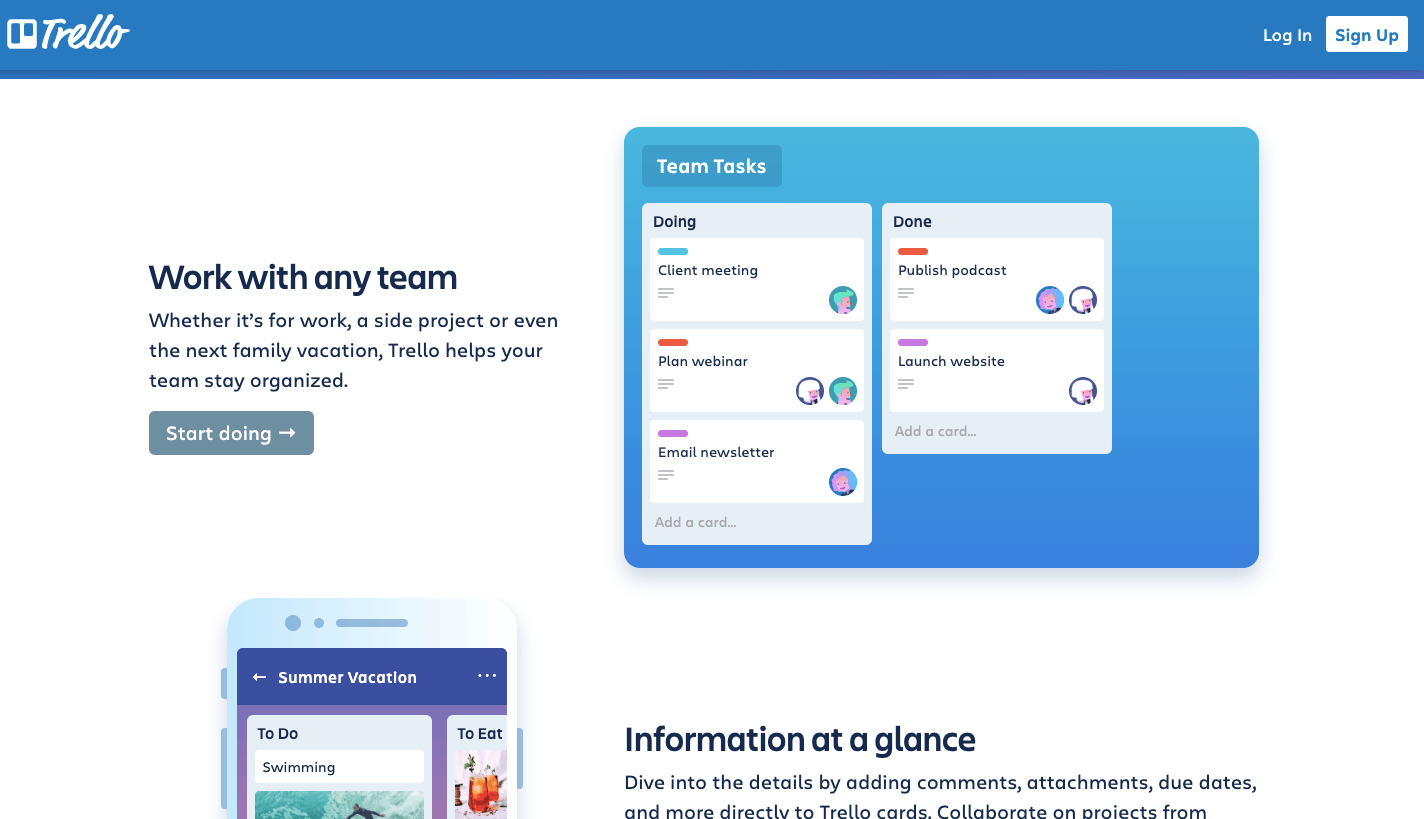
The most convenient part is that these lists and cards are visible to your whole team, and everyone can see who’s working on what! Result: less time spent on email, fewer meetings and increased individual productivity.
Trello has a great free plan that will suit most small business owners.
14. Zapier—automate tasks for peace of mind
All of the above freemium SaaS tools are designed for one purpose: making your life as a startup or small business easier. But sometimes, integrating all the technologies and having to manually do repetitive tasks with different tools is enough to kill hours on end.
That’s where Zapier steps in (ta-da)! Zapier is a SaaS automation tool that automates a chain of actions that you usually do manually in different apps. Instead of doing actions A+B manually, you can set up what’s called a “Zap” to automatically perform action B for every trigger A.
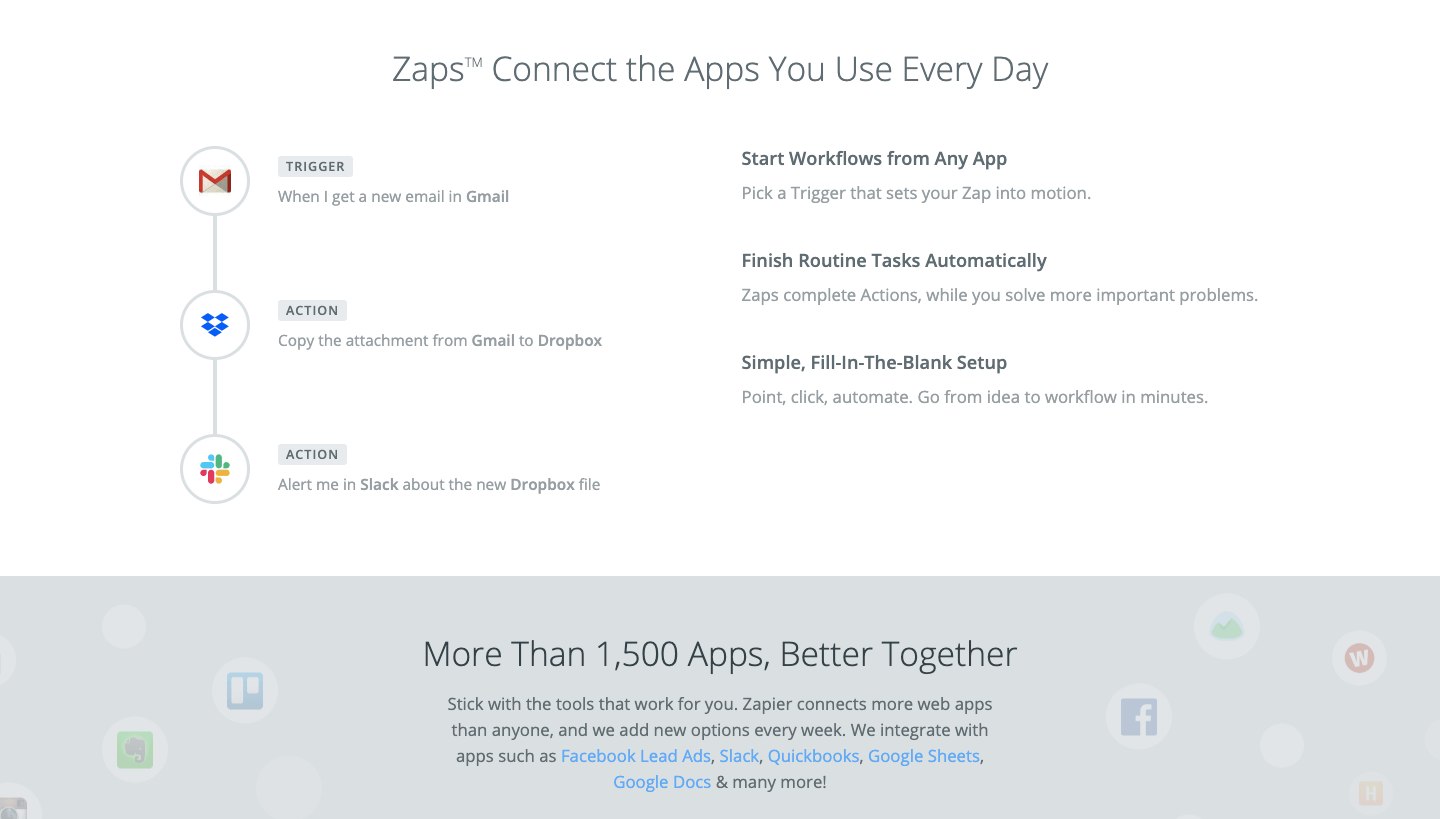
Let’s say you want to automate content sharing. Instead of manually copying and pasting post URLs into your Buffer queue or social media pages, set up a Zap to automatically share posts to any (or all) of your social media accounts via RSS feed.
Here are just a few other Zaps to mention: add transactions in Wave for new Stripe or Square sales; move MightyCall call history and client info to your CRM platform, Google Sheets or Slack; create SendinBlue/MailChimp subscribers from new Google Contacts; send automatic welcome letters to new subscribers; share new Shopify products with image tweets; add new Shopify orders to Salesforce as leads; and much more.
Check it out: MightyCall now integrates with Zapier
The free plan lets you automate up to 5 two-step Zaps (multi-step zaps are a premium feature) which for a small business is already a great time-saver.
15. eyezon—revolutionize your online live shopping experience
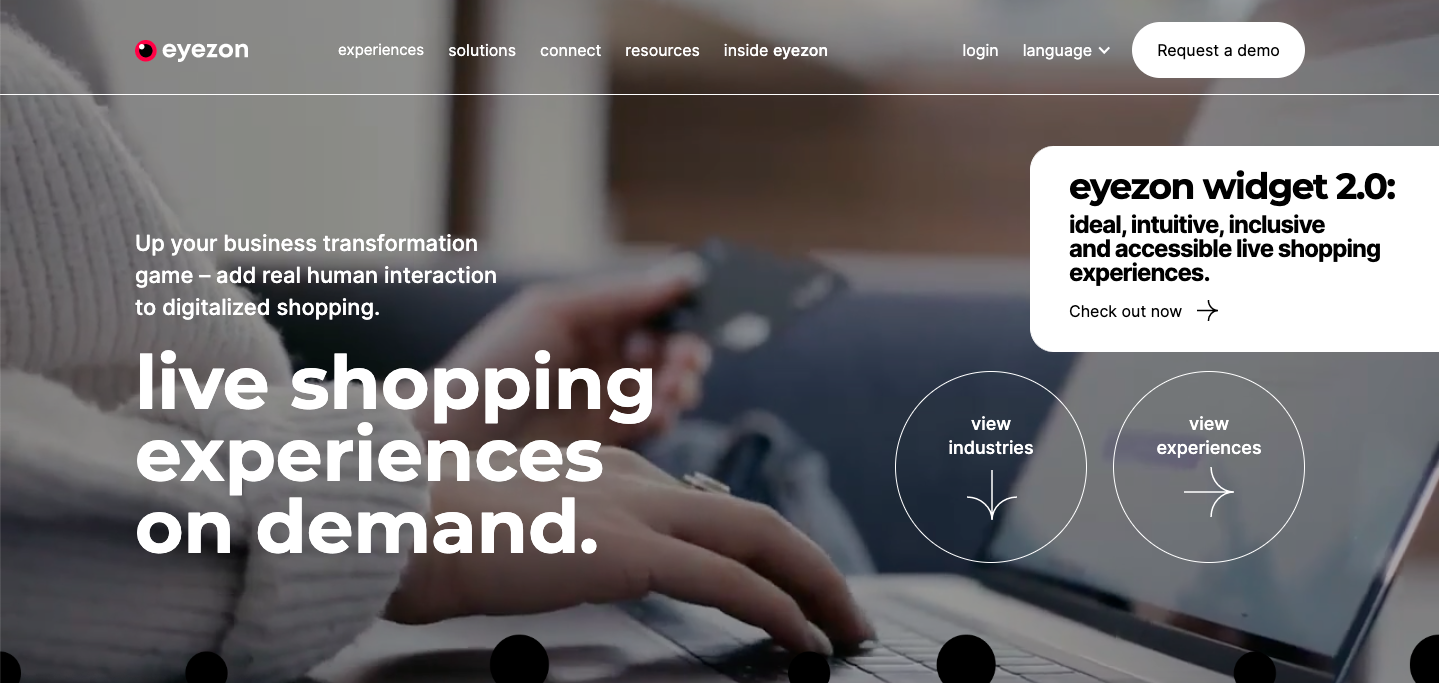
eyezon is a cutting-edge SaaS platform designed to transform your online shopping experience by connecting users with sales representatives and providing a live outlook into your business.
eyezon offers a suite of features, including customizable live shopping, live showrooms, live insights, ads, and streamerce with custom widgets tailored to various brands across all industries. By facilitating real-time interactions between customers and sales representatives, eyezon allows businesses to deliver personalized, interactive experiences that cater to individual needs and preferences.
Seamlessly integrating with popular content management systems and video hosting platforms, eyezon caters to businesses of all sizes. The platform offers a free plan that provides essential tools for enhancing your online shopping experience.
For businesses looking to maximize their online live shopping capabilities and unlock additional features, eyezon offers custom pricing plans. This comprehensive solution empowers businesses to revolutionize their customer engagement by providing an unparalleled online shopping experience tailored to the modern consumer.
Unlocking Potential with SaaS Products: Tailored Solutions for Small Business Success
SaaS products, specifically designed as small business SaaS, demonstrate that innovation need not be expensive, and ‘affordable’ doesn’t mean ‘inferior quality’. To choose the best SaaS for small business, collaborate with your business partners and team to identify your technology needs and priorities, and address the gaps in marketing, sales, and other areas.





























